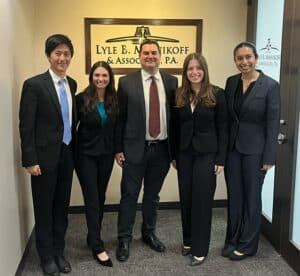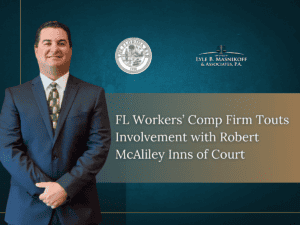When you’ve been injured on the job in Florida, workers’ compensation is designed to provide you with the support and benefits you need to recover and get back to work. One crucial aspect of workers’ compensation is indemnity benefits, which help replace a portion of your lost wages while you’re unable to work due to your injury. Understanding what are indemnity benefits is essential to ensure you receive the compensation you are entitled to under Florida law.
Have you been injured at work and struggling to understand your rights to indemnity benefits? Call us at (866) 519-3831 to schedule your free consultation with a Florida workers’ compensation attorney to discuss your case. At Lyle B. Masnikoff & Associates, we are committed to going the extra mile to help you navigate the complex world of workers’ compensation and ensure you receive the indemnity benefits you are entitled to receive.
Role of Indemnity Benefits in Florida’s Workers’ Compensation
Indemnity benefits are a type of financial compensation provided through the Florida workers’ compensation system. These benefits are intended to help replace a portion of your lost wages when you’re unable to work due to a work-related injury or illness. To be eligible for indemnity benefits, you must have suffered a compensable injury or illness that prevents you from earning your regular wages.
Types of Indemnity Benefits in Florida
Under Florida workers’ compensation law, there are several types of indemnity benefits available to injured employees, each designed to address different situations and levels of disability.
Temporary Total Disability (TTD) Benefits
TTD benefits are paid to employees who are unable to work due to their work-related injury or illness. These benefits are paid at a rate of 66-2/3% of the employee’s average weekly wage, subject to state maximum limits, and can be paid for up to 104 weeks. In cases involving the loss of an arm, leg, hand, or foot, or in cases of paralysis or blindness, the employee may be eligible for TTD benefits at a rate of 80% of their average weekly wage for up to 6 months.
Temporary Partial Disability (TPD) Benefits
TPD benefits are paid to employees who are able to return to work with restrictions but are earning less than 80% of their pre-injury average weekly wage. These benefits are calculated at 80% of the difference between 80% of the employee’s pre-injury average weekly wage and their post-injury earnings, subject to state maximum limits. TPD benefits can be paid for up to 104 weeks.
Permanent Total Disability (PTD) Benefits
PTD benefits are paid to employees who are permanently and totally disabled due to their work-related injury or illness. To qualify, the employee must meet specific criteria, such as the loss of both hands, arms, feet, legs, or eyes, or paralysis. PTD benefits are paid at a rate of 66- 2/3% of the employee’s average weekly wage, subject to state maximum limits, and can be paid until the employee reaches age 75, with some exceptions.
Impairment Income Benefits (IIBs)
IIBs are paid to employees who have reached maximum medical improvement (MMI) and have a permanent impairment rating. The amount and duration of IIBs are based on the employee’s impairment rating, with higher ratings resulting in longer periods of benefits. For example, an employee with a 10% impairment rating would receive IIBs for 20 weeks (2 weeks per percentage point), while an employee with a 20% rating would receive IIBs for 80 weeks (4 weeks per percentage point).
Claiming Indemnity Benefits
To claim indemnity benefits, you must:
- Report your injury to your employer within 30 days of the accident or within 30 days of the date you knew or should have known that your injury was work-related.
- File a workers’ compensation claim within 2 years of the date of the injury or the date you knew or should have known that your injury was work-related.
- Provide necessary documentation, such as medical records and wage information, to support
- Attend required medical evaluations to assess your condition and work capacity.
It’s important to note that the employer or carrier may require you to report your earnings and any income from social security while you are receiving indemnity benefits. Failure to comply with these reporting requirements may result in the suspension or nonpayment of your benefits.
Factors Affecting Indemnity Benefits
Several factors can impact your workers’ comp in Florida indemnity benefits, including:
- Statutory Waiting Period: In most cases, you must be disabled for at least seven days before you’re eligible for indemnity benefits.
- Average Weekly Wage (AWW): Your AWW is used to calculate your indemnity benefit rates and is typically based on your earnings in the 13 weeks prior to your injury.
- Maximum and Minimum Benefit Limits: Florida law sets maximum and minimum weekly benefit amounts that can impact your indemnity benefits.
- Return to Work Status: If you’re able to return to work in any capacity, your indemnity benefits may be reduced or suspended.
Challenges to Claiming Indemnity Benefits
Unfortunately, pursuing indemnity benefits is not always straightforward. You may face challenges such as:
- Denied claims, where your employer or their insurance carrier disputes your eligibility for benefits
- Underestimated benefits, where the insurance carrier miscalculates your benefit rates
- The need to navigate the appeals process if your claim is denied or your benefits are disputed
Role of a Workers’ Compensation Attorney in Securing Indemnity Benefits
Working with an experienced workers’ compensation attorney can be invaluable in securing the indemnity benefits you’re entitled to receive under Florida law. An attorney can:
- Protect your rights and ensure you’re treated fairly throughout the claims process
- Help you gather the necessary evidence and documentation to support your claim
- Navigate the legal process on your behalf, including filing appeals and representing you in hearings if necessary
Indemnity benefits are a vital component of the Florida workers’ compensation system, providing financial support when you’re unable to work due to a work-related injury or illness. By understanding the different types of indemnity benefits, the factors that affect them, and the process for claiming them, you can better protect your rights. If you’re facing challenges with your workers’ compensation claim or have questions about your eligibility for indemnity benefits, don’t hesitate to seek the guidance of experienced workmans’ comp lawyers in Florida.
Get the Support You Need
If you’ve been injured on the job in Florida, navigating the complex world of workers’ compensation can be overwhelming, especially when it comes to understanding your rights to indemnity benefits. Don’t struggle through this challenging time alone.
Schedule a free consultation with an experienced Florida workers’ compensation attorney at Lyle B. Masnikoff & Associates to discuss your specific situation and ensure you receive the indemnity benefits you are entitled to under Florida law. We can help you understand the different types of indemnity benefits, determine your eligibility, and guide you through the claims process.
Don’t miss out on the financial support you need to recover from your work-related injury. Take action today and protect your rights. Contact Lyle B. Masnikoff & Associates at (866) 519-3831 for a FREE, no-obligation consultation, or reach out to us through our online form. Let us go the extra mile to help you secure the indemnity benefits you are entitled to, so you can focus on your recovery and moving forward.
Copyright © 2024. Lyle B. Masnikoff & Associates, P.A. All rights reserved.
The information in this blog post (“post”) is provided for general informational purposes only and may not reflect the current law in your jurisdiction. No information in this post should be construed as legal advice from the individual author or the law firm, nor is it intended to be a substitute for legal counsel on any subject matter. No reader of this post should act or refrain from acting based on any information included in or accessible through this post without seeking the appropriate legal or other professional advice on the particular facts and circumstances at issue from a lawyer licensed in the recipient’s state, country, or other appropriate licensing jurisdiction.
Lyle B. Masnikoff & Associates, P.A.
1645 Palm Beach Lakes Blvd #550
West Palm Beach, FL 33401
(561) 598-7120
https://workerscompfl.net
Lyle B. Masnikoff & Associates, P.A.
7380 Sandlake Road, Suite 500
Orlando, FL 32819
(407) 896-0116
https://workerscompfl.net/
Lyle B. Masnikoff & Associates, P.A.
110 E Broward Blvd #1700
Fort Lauderdale, FL 33301
(954) 581-9115
https://workerscompfl.net/
Lyle B. Masnikoff & Associates, P.A.
543 NW Lake Whitney Place, Suite 106
Port St. Lucie, FL 34986
(772) 461-9181
https://workerscompfl.net/
























